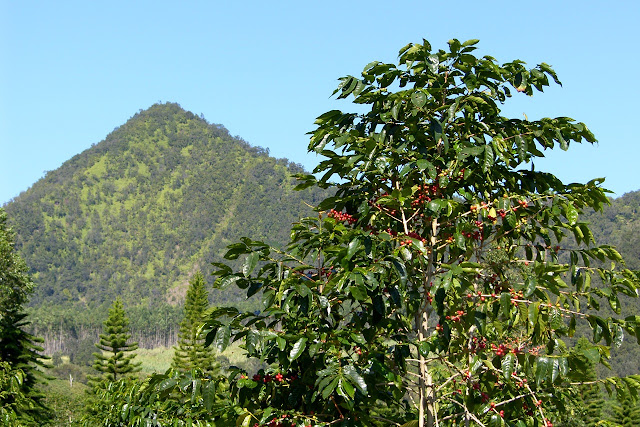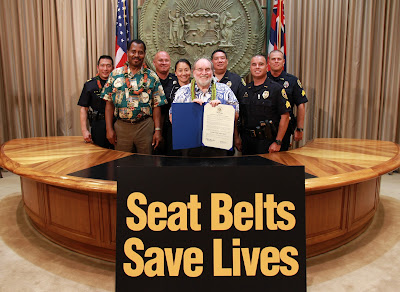 |
| Moa`ula coffee growers are anxiously waiting to see who the new owner of the land will be when it and other properties are auctioned at noon today. |
MOA`ULA COFFEE LANDS are scheduled to be auctioned off at noon today on the lanai of the First Circuit Court Building in Honolulu. The coffee farms, which have been the economic hope of more than 30 farmers since the shutdown of the sugar plantation in 1996, are tied up in the Lehman Brothers bankruptcy disaster of 2008. Lehman Brothers has foreclosed on 5,800 acres of farm, coastal and residential land in Ka`u that was purchased from C. Brewer subsidiaries by Windwalker, Hawai`i and WWK Hawai`i Holdings, a group led by developer Alan Worden.
The coffee growers farm fewer than 400 acres in a Project Unit Development area of some 2,000 acres that has been approved for subdivision into estates. The growers, who said all their leases are over or running out, are anxiously waiting to learn who will be the new owner and possibly new manager for the lands. If Lehman Bros. keeps the property by not accepting any bids, it could later sell off parcels perhaps at higher prices than the the price that could be drawn for the 5,800 acres that are bundled for the all-or-nothing sale at auction.Other properties included in the bundled sale include large acreage around Waikapuna, lands on the hillside of Honu`apo and lots with and without homes.
 |
| Gov. Abercrombie signed a law requiring all occupants of a vehicle to buckle up. Photo from Office of the Governor |
GOV. NEIL ABERCROMBIE HAS SIGNED INTO LAW two traffic safety bills aimed at saving lives and reducing serious injuries from motor vehicle crashes in Hawai`i.
“Hawai`i is putting safety first on our roadways with the enactment of our state’s universal seat belt law. This measure closes the gap in protecting all passengers riding in a motor vehicle,” Abercrombie said. “In addition, the enactment of Hawai`i’s distracted driving law establishes consistency across the state for the use of mobile electronic devices while driving, simplifying enforcement and likewise making our highways and roadways safer.”
Senate Bill 4, enacted as Act 73, is effective immediately. It requires all front- and back-seat occupants to buckle up. Adults and children must use their seat belts and child restraints at all times. Unrestrained back-seat passengers were more than three times as likely to have injuries that were fatal or required hospitalization compared to restrained back seat passengers, based on a state Department of Health analysis of Emergency Medical Services records. Additionally, among back seat passengers who were treated for injuries by EMS, average medical charges were nearly tripled among those who did not use seat belts, compared to restrained passengers.
“The Department of Health is pleased to see rates of passenger-related injuries going down based on high levels of seat belt use among front-seat passengers,” said director Loretta Fuddy. “We anticipate that we’ll see further reductions in injuries and death with the passage of this law for back seat passengers.”
House Bill 980, enacted as Act 74, is effective July 1. While all counties have some form of a distracted driving ordinance in place, this measure establishes a state law that creates consistent requirements across all counties for the use of mobile electronic devices while driving and will simplify enforcement. Crash data from the Department of Transportation shows that during 2007, 32 percent were attributed to inattention to driving. “People are injured or dying each year simply because they were not paying attention to the road. The possibility of causing a crash that could ruin lives is just too great,” said DOT director Glenn Okimoto. “We are focusing on changing the behaviors of drivers through legislation, enforcement, public awareness and education – the same activities that have helped curb impaired driving and increased seat belt use. Our goal is to help drivers understand that texting, cell phone use, and other distractions behind the wheel can have dangerous consequences.”
The bill signings were held in conjunction with DOT’s launch of the annual Click It or Ticket enforcement campaign, a partnership between the state and counties with federal funding.
House Bill 980, enacted as Act 74, is effective July 1. While all counties have some form of a distracted driving ordinance in place, this measure establishes a state law that creates consistent requirements across all counties for the use of mobile electronic devices while driving and will simplify enforcement. Crash data from the Department of Transportation shows that during 2007, 32 percent were attributed to inattention to driving. “People are injured or dying each year simply because they were not paying attention to the road. The possibility of causing a crash that could ruin lives is just too great,” said DOT director Glenn Okimoto. “We are focusing on changing the behaviors of drivers through legislation, enforcement, public awareness and education – the same activities that have helped curb impaired driving and increased seat belt use. Our goal is to help drivers understand that texting, cell phone use, and other distractions behind the wheel can have dangerous consequences.”
The bill signings were held in conjunction with DOT’s launch of the annual Click It or Ticket enforcement campaign, a partnership between the state and counties with federal funding.
REGARDING HAWAI`I COUNTY’S TESTIMONY on the proposed contract for `Aina Koa Pono to sell biofuel refined above Pahala from biomass grown in Ka`u to Hawai`i Electric Light Co., the state Consumer Advocate asked the county to provide all analyses upon which it relied as the basis for its position “that HELCO termination of the proposed AKP agreement has the potential to delay meeting its renewable energy objectives.”
“The AKP project is estimated to contribute approximately two percent toward Hawai`i’s Renewable Portfolio Standards,” Hawai`i county responded. “On the Big Island, AKP diesel will supply (redacted as confidential) of the target facility’s diesel consumption, and over (redacted as confidential) of total power-generation diesel demand on the Big Island. AKP is relying on early-stage technology (and, based on lack of evidence to indicate otherwise, extremely early-stage technology) that has yet to be demonstrated at meaningful larger scale. In an industry where there are substantial, and often project-killing, scale-up risks between laboratory/small-scale demonstrations and commercial operations, any potential customer of products made from such processes is wise to exercise caution.
 |
| Hawai`i County calls AKP's MicroDee process "extremely early-stage technology." Photo from TekGar |
“Analysis in the original 2011-0005 docket indicates that AKP biodiesel is an important, but not the sole contributor to meeting RPS biofuel expectations: ‘The analyses show that there is no single answer for the companies to meet the challenges of the RPS requirements, but the HELCO biodiesel is one strategy that would help the near-term and long-term RPS requirements.’
“With such a large commitment of its demand based on such early-stage technology — that inherently carries large risks of scale-up — it is not inconceivable that the HELCO-AKP contract is terminated. For example, AKP may simply be unable to make fuel. The fuel may not meet specifications. AKP may not be able to deliver fuel within economic constraints of the fixed price, and may choose to shut down.
“In any of these events, the end result would be that – after however many years it has taken to get to this point – a substantial component of the utility’s and the state’s renewable power expectations would disappear, and the utility and state will be that much behind in meeting their RPS goals.
“Since it is true that the Big Island already exceeds RPS targets, this may not be of such importance for the Island of Hawai`i – although there will be disruptions as new diesel supply sources must be established. This setback to the RPS may be of greater importance at the state level, however, and it is at the Commission’s discretion to determine whether basing such large contributions to the RPS on such early-stage technology is good policy.
More testimony will be covered in future Ka`u News Briefs. All testimony is available at puc.hawaii.gov.
VOLCANO ART CENTER’S 2013 iFILM CAMP is accepting financial aid applications through this Friday. The camp, which focuses on video production arts, is for ages 10 to 14. It will be held at VAC’s Ni`aulani Campus in Volcano Village weekdays from June 3 to June 14, 9 a.m. to 4 p.m.
The first week focuses on storyboarding, shot lists, camera basics, performance arts and equipment use and care. The goal for week one is to complete a public service announcement on a community need in Volcano.
The second week’s project progresses into creating a five- to 15-minute biographical project on a local Volcano “celebrity.” All projects focus on the importance of teamwork.
Fees are $400, or $360 for VAC members. Space is limited to eight students. Call 967-8222 to register.
“In any of these events, the end result would be that – after however many years it has taken to get to this point – a substantial component of the utility’s and the state’s renewable power expectations would disappear, and the utility and state will be that much behind in meeting their RPS goals.
“Since it is true that the Big Island already exceeds RPS targets, this may not be of such importance for the Island of Hawai`i – although there will be disruptions as new diesel supply sources must be established. This setback to the RPS may be of greater importance at the state level, however, and it is at the Commission’s discretion to determine whether basing such large contributions to the RPS on such early-stage technology is good policy.
More testimony will be covered in future Ka`u News Briefs. All testimony is available at puc.hawaii.gov.
VOLCANO ART CENTER’S 2013 iFILM CAMP is accepting financial aid applications through this Friday. The camp, which focuses on video production arts, is for ages 10 to 14. It will be held at VAC’s Ni`aulani Campus in Volcano Village weekdays from June 3 to June 14, 9 a.m. to 4 p.m.
The first week focuses on storyboarding, shot lists, camera basics, performance arts and equipment use and care. The goal for week one is to complete a public service announcement on a community need in Volcano.
The second week’s project progresses into creating a five- to 15-minute biographical project on a local Volcano “celebrity.” All projects focus on the importance of teamwork.
Fees are $400, or $360 for VAC members. Space is limited to eight students. Call 967-8222 to register.
 |
| Hawai`i County Police Chief Harry Kubojiri |
HAWAI`I COUNTY POLICE DEPARTMENT holds a community meeting today from noon to 2 p.m. at Na`alehu Community Center to allow the public to meet the Police Department’s command staff and to discuss concerns with the police chief and commanders who oversee police operations in Ka`u.
AUDITIONS FOR BEAUTY AND THE BEAST continue this evening at 6:30 p.m. at Kilauea Military Camp Theater in Hawai`i Volcanoes National Park. Kilauea Drama & Entertainment Network presents the musical July 12 – 28.
For more information, call 982-7344, email kden73@aol.com or check KDEN’s Facebook page.
SUPPORT OUR SPONSORS AT PAHALAPLANTATIONCOTTAGES.COM AND KAUCOFFEEMILL.COM. KA`U COFFEE MILL IS OPEN SEVEN DAYS A WEEK.
ALSO SEE KAUCALENDAR.COM AND FACEBOOK.COM/KAUCALENDAR.












